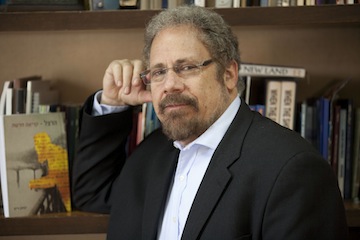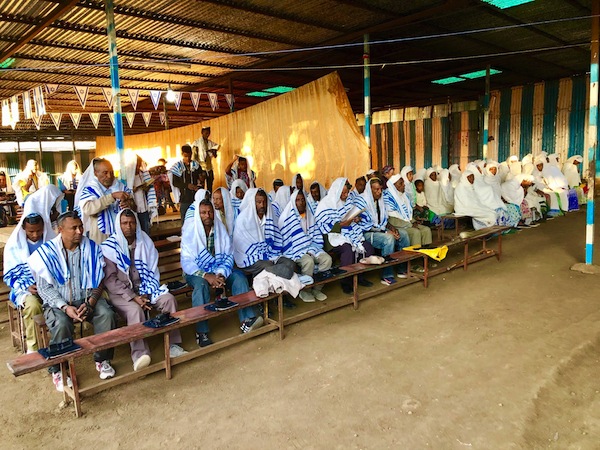Morning prayers in Gondar’s Tikvah Synagogue. (photo from David Breakstone)
Since Dr. David Breakstone, deputy chair of the executive of the Jewish Agency, had to cancel his scheduled talks in Calgary and Winnipeg because of COVID-19, the Jewish Independent reached him by phone to learn more about his planned topic – Beta Israel and the Emerging Jewish Communities of the Amazon and Latin America.
Born and raised in the United States, Breakstone made aliyah in 1974 and has been involved with Jewish education for more than 50 years.
“The Jewish Agency (JA) really is the largest global Jewish organization that represents the full spectrum of the Jewish people,” said Breakstone. “JA itself is a partnership of the World Zionist Organization, the Jewish Federations of North America. It makes for a very dynamic, stimulating environment with incredible reach and ability, impacting our major issues and agenda items regarding world Jewry. To be in a position to impact all of that and influence things is, for me, a very exciting and demanding challenge.”
JA’s four major goals are connecting Jews around the world to one another, their Jewish heritage and to Israel; facilitating aliyah; serving those in need in Israeli society and fighting antisemitism; and assuring the safety and security of Jews everywhere.
The term Beta Israel refers to the Ethiopian Jewish community, thought to be descendants of the Hebrew tribe of Dan, explained Breakstone.
“Back in the 1950s, the JA was building schools and developed a teaching seminary in Ethiopia to work with the community,” he said. “Ethiopian Jewry has presumably been around for thousands of years, but has only been known about for the last 1,000 years…. The Beta Israel are unquestionably fully Jewish. Ovadia Yosef, chief rabbi of Israel back in 1973, confirmed the decision of a response of the Radbaz [David ben Solomon ibn Abi Zimra] from the 16th century. What’s happened, however, is that there are those of Jewish descent from Beta Israel who, over the years, converted to Christianity … and, so, there are major questions still being argued about whether they converted out of duress or whether they converted freely or for economic reasons.”

Regardless, said Breakstone, “There’s full agreement by the authorities in Israel on whether they are all … zera Israel (of Jewish seed), even if they are not, according to halachah [Jewish law], Jewish.”
The JA is involved with this community because of its Jewish roots. Today, said Breakstone, there are somewhere between 7,500 and 9,000 people from this community who have been waiting anywhere from 10 to 20 years or more to be allowed to make aliyah, all of whom have close relatives in Israel. The JA, he said, is committed to bringing to Israel all Ethiopians who are eligible to come.
Breakstone noted that there are other isolated Jewish communities throughout Africa, South America and India, which he referred to as “the emerging communities of Jews around the world.”
“The Ministry of the Diaspora, a couple of years ago, expressed a great deal of interest in these emerging communities,” he said. “And they put together a very high-level committee that really delved into the issue in depth and came up with the astounding figure of – believe it or not – some 350 million people around the world who have some sort affinity to the Jewish people.
“Affinity is a very vague term,” he cautioned. “In fact, a recent DNA report indicated that 24% of Latin Americans had a significant amount of Jewish DNA…. Most claim ancestry going back to the Marranos, Conversos and Crypto-Jews from Portugal and Spain who had moved to South America and kept various traditions going.
“In Brazil,” he said, “there was supposed to be – they just got notification that it was cancelled – there was going to be the first conference of Jewish communities of Brazil that are not recognized by the established Jewish community there … all of whom are connected through their belief that they are descended from Marranos, Conversos.”
Despite the cancelation of the conference, the Jewish Federation of Brazil is in contact with those communities and is exploring whether or not to recognize them and invite them into the larger community.
“At this point,” said Breakstone, “the JA is also exploring the history in conjunction with the established Jewish community, trying to figure out what to do with those who have not been part of the traditional Jewish establishment and yet, are living life as Jews. That’s quite an interesting phenomenon.”
Uganda is home to a Jewish community that claims no Jewish roots, Breakstone added. In that community, the founding chief was converted by Christian missionaries more than a century ago. And the chief, becoming well-versed in religious studies through the Bible, decided Judaism was the right path.
“Since 2002, they started going to formal conversion, through the worldwide Conservative movement,” said Breakstone. “They now have a local rabbi who studied at one of the Conservative movement theological seminaries … in California and they are fully embraced by the Conservative Jewish world. The JA, too, officially recognizes them as being Jewish. They’ve had a number of people come to Israel through various programs and a number of them are in the process of making aliyah.
“I think the diversity of the different Jewish communities, backgrounds, traditions and cultures that people bring to Jewish life are also something to be celebrated,” he said, “as it broadens the Jewish mosaic.”
Rebeca Kuropatwa is a Winnipeg freelance writer.

